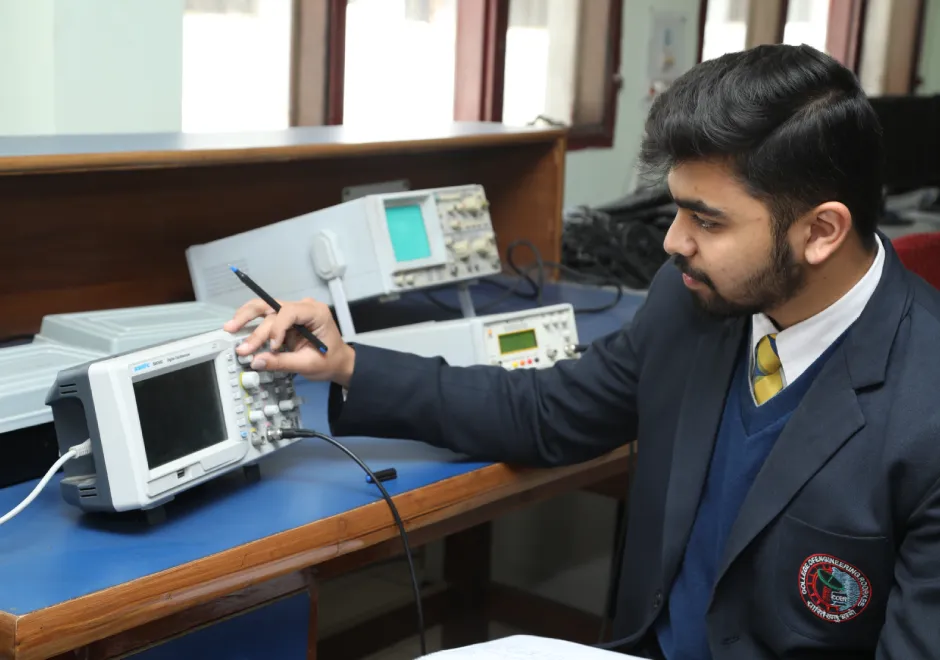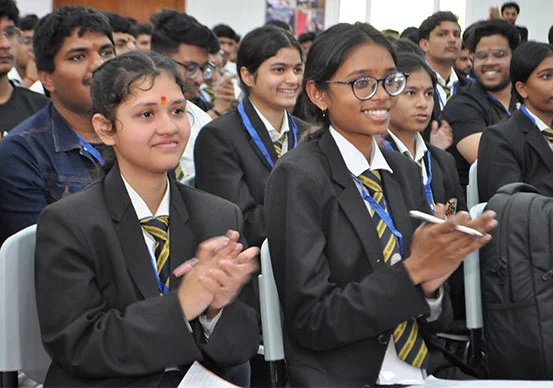
B. Tech Electrical Engineering with Major Specialization in Electric Vehicle Technology
Department of Electrical And Electronics Engineering
Duration
4 Years
Eligibility Criteria
B.Tech. 4 YEARS
Candidate must have passed 10+2 or equivalent from a recognized educational board with Physics, Mathematics as core subjects and third Subject from the Following Subjects (Chemistry / Computer Science / Electronics / Information Technology / Biology / Informatics Practices Biotechnology / Technical Vocational subject / Agriculture / Engineering Graphics / Business Studies / Entrepreneurship) with a minimum aggregate score of 45% (40% in case reserved category) in above subjects taken together.

B. Tech Electrical Engineering with Major Specialization in Electric Vehicle Technology
Electrical Engineering program is designed to provide a strong foundation in fundamental concepts, while encouraging hands-on and innovative thinking to meet the demands of modern engineering challenges. With a Major Specialization in Electric Vehicle Technology, students gain in-depth knowledge of EV design, battery management systems, power electronics, and electric drivetrain technologies. The program integrates advanced labs, smart classrooms, and real-world simulations to provide hands-on experience through industry collaborations, internships, and research projects, students are prepared to meet the growing demand in the sustainable mobility sector. This specialization empowers graduates at the forefront of the green energy revolution, equipped to drive innovation and transformation.
Apply NowAdmissions 2026
Find your path to Success
Career Path
B.Tech Electrical Engineering offers a wide range of career opportunities in a countless number of industries, including manufacturing, power generation, telecommunications, electronics, automation, and aerospace.

Program Outcomes POs
-
PO1
Engineering Knowledge: Apply knowledge of mathematics, science, engineering fundamentals, and an engineering specialization to solve complex engineering problems.
-
PO2
Problem Analysis: Identify, formulate, review research literature, and analyze complex engineering problems reaching substantiated conclusions using first principles of mathematics, natural sciences, and engineering sciences.
-
PO3
Design/Development of Solutions: Design solutions for complex engineering problems and design systems, components, or processes that meet specified needs with appropriate consideration for public health and safety, cultural, societal, and environmental considerations.
-
PO4
Investigation of Complex Problems: Conduct investigations of complex problems using research-based knowledge and research methods, including design of experiments, analysis, and interpretation of data, and synthesis of information to provide valid conclusions.
-
PO5
Modern Tool Usage: Create, select, and apply appropriate techniques, resources, and modern engineering and IT tools, including prediction and modeling, to complex engineering activities with an understanding of the limitations.
-
PO6
The Engineer and Society: Apply reasoning informed by the contextual knowledge to assess societal, health, safety, legal, and cultural issues and the consequent responsibilities relevant to the professional engineering practice.
-
PO7
Environment and Sustainability: Understand the impact of professional engineering solutions in societal and environmental contexts and demonstrate the knowledge of and need for sustainable development.
-
PO8
Ethics: Apply ethical principles and commit to professional ethics and responsibilities and norms of the engineering practice.
-
PO9
Individual and Team Work: Function effectively as an individual and as a member or leader in diverse teams and in multidisciplinary settings.
-
PO10
Communication: Communicate effectively on complex engineering activities with the engineering community and with society at large, such as being able to comprehend and write effective reports and design documentation, make effective presentations, and give and receive clear instructions.
-
PO11
Project Management and Finance: Demonstrate knowledge and understanding of the engineering and management principles and apply these to one's own work, as a member and leader in a team, to manage projects and in multidisciplinary environments.
-
PO12
Lifelong Learning: Recognize the need for, and have the preparation and ability to engage in independent and lifelong learning in the broadest context of technological change
Program Specific Outcome PSOs
-
PSO1
The students will acquire comprehensive understanding of concepts, analysis, operation and performance of all major aspects of electrical engineering such as networks, measurement and measuring instruments, electrical rotating machines, drives and transformers, power systems, control systems, power electronics and communication engineering.
-
PSO2
The students will have knowledge of
(i) analytical tools for developing modeling and simulation of given problems, and
(ii) experimental tools for performance investigations -
PSO3
The students will have acquired the ability to understand the scope of research work in major streams
Program Educational Objectives PEOS
-
PEO1
To equip the students with lifelong skills so that they can work and contribute to the infrastructural development projects of the public and private sectors.
-
PEO2
To provide research-oriented education with knowledge of state-of-art analytical and experimental tools to enable students to pursue higher studies in institutions of repute in India and abroad.
-
PEO3
To provide skill enriched education and training through internships to enable students to launch start-ups in their field of study.
-
PEO4
To inculcate a culture of professionalism, ethical conduct, team work with good communication skills to enable the students to be successful in their career.









